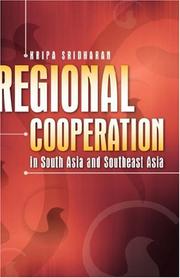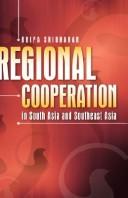| Listing 1 - 3 of 3 |
Sort by
|

ISBN: 9789812304353 9789812304261 9789812307200 Year: 2007 Publisher: Singapore Institute of Southeast Asian Studies
Abstract | Keywords | Export | Availability | Bookmark
 Loading...
Loading...Choose an application
- Reference Manager
- EndNote
- RefWorks (Direct export to RefWorks)

ISBN: 9789812307200 9789812304353 Year: 2007 Publisher: Singapore ISEAS Publishing
Abstract | Keywords | Export | Availability | Bookmark
 Loading...
Loading...Choose an application
- Reference Manager
- EndNote
- RefWorks (Direct export to RefWorks)

ISBN: 9812307206 9812304355 9812304266 9814459003 9789814459006 9789812307200 Year: 2007 Publisher: Singapore : Institute of Southeast Asian Studies,
Abstract | Keywords | Export | Availability | Bookmark
 Loading...
Loading...Choose an application
- Reference Manager
- EndNote
- RefWorks (Direct export to RefWorks)
The general view about regionalism seems to be that it is better to have regionalized and faltered than never to have regionalized at all! Inspired by this observation, this study aims to provide a comparative sketch of regionalism in South and Southeast Asia in the light of recent regional developments. Since regionalism is both a pervasive and amorphous phenomenon a straightforward account of its similarities and differences cannot be easily set down. But the broad patterns of behaviour of the regional actors who gather under a regional roof can be captured and compared. To compare is not only to understand but to improve and avoid the avoidable. This book analyses the highs and lows of regional experience mainly in South Asia (South Asian Association for Regional Cooperation or SAARC) and Southeast Asia (Association of Southeast Asian Nations or ASEAN) interspersed with references to the European Union (EU) where relevant. The book argues that regionalism is here to stay and both imitation and innovation are the preferred strategies for sustaining the process. It points out that economic integration requires certain prior conditions to be fulfilled and does not happen merely because governments wish it to happen.
Regionalism --- Human geography --- Nationalism --- Interregionalism --- South Asian Association for Regional Cooperation. --- ASEAN. --- Association of Southeast Asian nations --- SAARC (South Asian Association for Regional Cooperation) --- S.A.A.R.C. --- South Asian Association for Regional Co-operation --- Sārka --- South Asian Regional Cooperation --- South Asia --- Southeast Asia --- Asia, Southeast --- Asia, Southeastern --- South East Asia --- Southeastern Asia --- Asia, South --- Asia, Southern --- Indian Sub-continent --- Indian Subcontinent --- Southern Asia --- Orient --- Economic integration. --- Politics and government --- Politics and government.
| Listing 1 - 3 of 3 |
Sort by
|

 Search
Search Feedback
Feedback About UniCat
About UniCat  Help
Help News
News